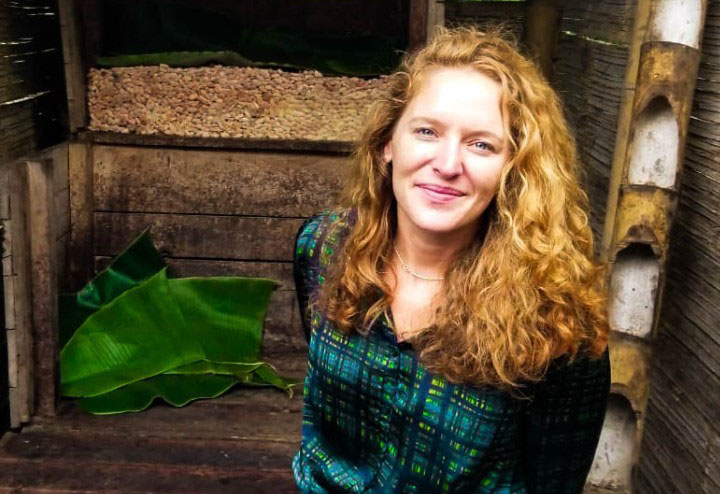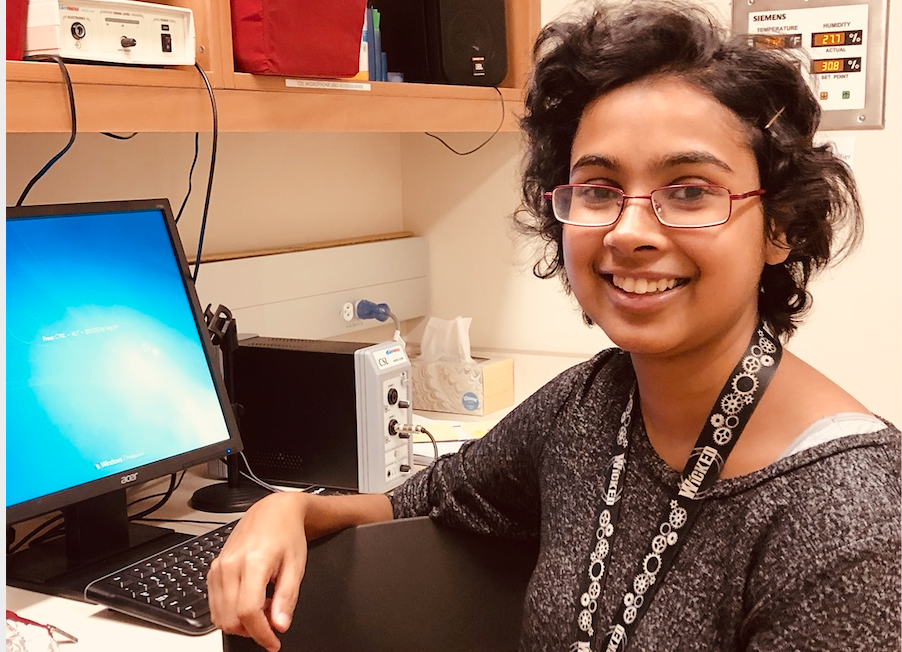The Graduate School’s Fellowship Office guides students and postdocs through funding process
 Jessica Eise is a postdoctoral scholar at Purdue University and a 2020 graduate from the University’s Brian Lamb School of Communication.
Jessica Eise is a postdoctoral scholar at Purdue University and a 2020 graduate from the University’s Brian Lamb School of Communication.
Graduate students and postdoctoral scholars navigating the labyrinth of grant and fellowship applications often have questions. Which fellowship should I apply for? How can I tell a persuasive story about my research? How can I make myself stand out?
Whether an applicant needs an answer to a quick question, a thorough review of a draft, or one-on-one strategy session, the Graduate School’s Fellowship Office Grantsmanship Team is here to help.
The Fellowship Office Grantsmanship Team, housed in The Graduate School in Young Hall and available virtually, serves applicants of external grants and fellowships. Dr. Lisa Nielsen, Grant Writer and Postdoc Office Director, helps applicants learn about government, industry, and foundation fellowship and grant opportunities; teaches grant writing skills; offers webinars, workshops, and online resources; and conducts one-on-one consultations. Two current NSF Fellows work as Fellowship Writing Coaches who provide help with writing consultations and give feedback on writing.
Nielsen is no stranger to the trials and tribulations of fellowship applications. When she was a student, she won an NSF Graduate Research Fellowship, learning how to apply mostly through the school of hard knocks. She attended the only one-hour workshop her undergraduate institution offered on the topic, then figured out the rest on her own.
That experience inspired the development of Nielsen’s first workshop for the NSF Graduate Research Fellowship. While building the presentation, Nielsen asked herself, “What did I have to learn the hard way, by talking to multiple people and working on eight different drafts to get the formula down? What did my editing process look like?”
She distilled those lessons learned and knowledge acquired over the years in the Fellowship Office into proven processes and strategies used today to guide Purdue master’s students, doctoral students, and postdocs into producing competitive applications.
The data for one of the most sought after fellowships indicate that her methodology works: 23.5% of Purdue NSF Graduate Research Fellowship applicants received the fellowship for the 2020 award year compared to the 12% success rate of total NSF applicants nationally.
The Persistent Pursuit
Nielsen and the team teach applicants about the nuts and bolts of applying. They can help determine if applicants are eligible for a fellowship or grant and advise on when and how to apply. But the applicant needs to bring something to the table as well: persistence.
Jessica Eise, a postdoctoral scholar at Purdue University and a 2020 graduate from the University’s Brian Lamb School of Communication doctoral program, approached the Fellowship Office while she was still a graduate student for help with a dissertation research improvement grant. Her first submission was rejected, but the program officer called to tell her they saw potential and encouraged her to reapply.
The second time Eise submitted her proposal, the review was delayed. Eise had already graduated with her PhD when an NSF program officer called to say that her grant was found to be competitive, and they wanted her to reapply under the NSF Early-Concept Grants for Exploratory Research (EAGER) Standard Grant.
The EAGER Standard Grant is competitive among faculty members who are proposing full-blown research projects. The proposal is much more involved than a fellowship application, and it required Eise to develop a budget for the project in collaboration with Sponsored Program Services.
“Lisa Nielsen provided me with invaluable one-on-one support across the entire process,” said Eise. “Lisa reviewed my documents and provided excellent and detailed feedback on how and where I can improve. Not only did this improve the quality of my documents, but it also tightened my vision for my project.”
Ultimately what Eise called an “exercise in endurance” paid off. She was awarded the NSF EAGER Standard Grant, a one-year grant for $71,146. The award enabled her to start a postdoctoral position with her own funding as the principal investigator on a research grant.
Today Eise is working to create a communication infrastructure for coffee farmers in Colombia to facilitate information sharing and adaptation of farming practices prompted by climate change.
“More than anything, fortitude and keeping at it (despite setbacks) is as important or more than having a good idea,” Eise said. “Anticipate rejection. But rejection is okay. What is worse? Never trying? I’m not the world’s biggest fan of clichés, but there is a lot of truth to this one… you miss all of the shots you don’t take. If you believe in the importance of your work and its ability to positively transform our world, don’t let anyone stop you.”
Achieving Clarity in Technical Data

Anumitha Venkatraman is a fourth-year PhD student in the Purdue University Speech, Language, and Hearing Sciences program.
The Fellowship Office provides on average 30 to 60 writing consultations and 20 fellowship writing workshops each semester. Over 2,000 graduate students and postdocs have attended the workshops over the past two years (repeat attendees counted) since Nielsen began leading the group and tracking the statistics.
If it breaks down the copious requirements of these applications into achievable, easy-to-understand steps, if it advances proposals from good to great, if it converts applications into awards, it has been rolled into the Fellowship Office’s repertoire of support.
Anumitha Venkatraman, a fourth-year PhD student in the Purdue University Speech, Language, and Hearing Sciences program, approached the Fellowship Office for support in the summer of 2019 for help applying for an NIH F31 Fellowship. This is a very prestigious award; Purdue has on average five NIH predoctoral fellowship recipients each year.
Venkatraman’s research may one day benefit individuals who undergo surgical intervention for various voice problems in order to restore the way the vocal folds produce sound. Her research will use a rat model to look at the effects of dehydration on the process of vocal fold wound healing following a surgical procedure.
Venkatraman attended an NIH F31 information session conducted by the Fellowship Office while she was formulating the research question for her application. The session and materials provided assisted her in setting “realistic, self-imposed deadlines” as she worked through the application process. Nielsen also provided extensive comments on multiple aspects of her application.
By October, word came back from NIH that Venkatraman’s proposal had gotten a high score, and ultimately she learned that she had won the fellowship, which will help fund her through graduation.
“It was extremely helpful to have the perspective of an expert outside my field of study. Her comments definitely increased the clarity of my writing,” said Venkatraman.
Thanks to the fellowship, Venkatraman has more dedicated research time and looks forward to writing more proposals in the future as a postdoc or faculty member.
“As long as you have your advisor on board, there is nothing stopping you from writing an amazing grant, especially because there are so many resources on campus (like the Fellowship Office) to provide you with additional support,” Venkatraman said. “I think the key is to start thinking of your research question early-on in your PhD. The grant writing and reviewing process can take a while.”
Ready to apply for your first fellowship or grant? Here are some resources to get you started:
· Fellowship Office: https://www.purdue.edu/gradschool/fellowship/
· Resources for Fellowships and Grant Writing (requires Purdue username and non-Boiler Key password): https://wiki.itap.purdue.edu/display/FellowshipAndGrantWriting
· Webinar Sign-up: https://gspd.gosignmeup.com/public/Course/browse
· Watch for webinar announcements in the Professional Development newsletter
Source: Lisa Nielsen, lnielse@purdue.edu